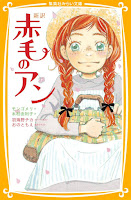Kate: In The Shore in Twilight, The Queen Mother of the West comes across as a rather remote, entirely rational being. This view of heaven is far closer to the views of C.S. Lewis--who perceived the dead as inherently disinterested in the problems of mortality--than, say, the perspective of the movie Ghost.
Do both approaches exist in Japanese art? Remote heaven and concerned heaven? Does one approach take precedence over the other? There's always the Catholic approach—God is remote but saints are close. How does that compare?
Eugene: Heaven, in the Christian sense, is "over the horizon." This in contrast to the heaven of the pantheon, the country club where the gods hang out. Basically the rules making committee. Shows like Kamichu, Gingitsune, and Noragami have a lot of fun with the godhead as a vast bureaucracy that constantly bickers and fights like the Greek gods (when they're not partying).
Though if you play your cards right, it doesn't hurt to get one of the minor gods on your side, like Yato in Noragami. Noragami tackles both the high and the low, dealing with the dead that have remained behind because of their worldly attachments and are causing problems, and also with the convoluted politics of the pantheon (Yato made a lot of enemies in the past).
Kate: A Mormon movie--I think it was God's Army--argued that the God one believes in is entirely determined by one's parental figure. How was a person raised to believe authority figures should or will behave? Does the same exist here?
Eugene: It seems a weird reversal, but the West (speaking broadly) insists that society is responsible for the individual, while the East says that the individual is responsible for society ("every man is a part of the main"). This leads to a "nail that sticks up gets hammered down" mentality. But it also has the paradoxical effect of placing responsibility back on the individual.
"Self-esteem" doesn't exist in the Chinese lexicon, at least not in the way Americans use it. In China, a child's regard for herself is rarely as important as [are] stark evaluations of performance. Almost as if child-rearing were an Olympic sport, the Chinese rank children on everything from work ethic to Chinese character recognition and musical skill.
The difference in Japan is that Japanese parents spend less time in tiger mom mode. Rather, they (and society at large) set rigorous goals and expectations that children are supposed to aspire to and achieve through their own effort (ganbaru). More often than not in Japanese high school dramas, the parents are nowhere in sight, or are hanging back at a safe distance.
Of course, the real world might beg to differ. But it is interesting what gets idealized in our storytelling. This may explain why the spunky orphan (or virtual orphan) who rises above the lousy hand she was dealt in life is such a popular character in Japanese YA fiction.



No comments:
Post a Comment